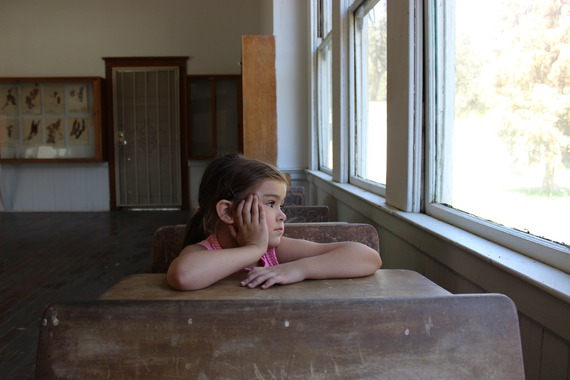This week, Governor Chris Christie unveiled a plan to cut funding for more than half a million schoolchildren in the state of New Jersey. His scheme, which he disingenuously bills as "property tax relief," strips the state's funding formula of the provisions that currently provide more state aid to low-wealth, low-income school districts and to schools serving disadvantaged children.
The Governor is proposing that all students in New Jersey receive the same amount of state aid to support their education, regardless of any special learning needs that they may have and regardless of how much funding their town's property tax base can yield to fund schools from local wealth. If passed, students with limited English proficiency and those from low-income homes will receive significantly less money to support their learning, and schools serving affluent students who are already ahead of the curve will receive a windfall of cash.
Christie wants to amend the state constitution just to fund his reverse-Robin-Hood scheme. He knows that, as it stands now, the New Jersey Supreme Court has ruled that it is against the law to allow low-income children whose communities cannot raise enough money for an adequate education to be disadvantaged as a result.
Specifically, the courts, in the landmark case Abbott v. Burke, stated, "Our constitutional mandate does not allow us to consign poorer children permanently to an inferior education on the theory that they cannot afford a better one or that they would not benefit from it."
Apparently, Christie disagrees.
Indeed, the Governor didn't hide his intentions for very long. When revealing his new "Fairness Formula," he made it clear which communities to whom he thought this would be "fairest." At Hillsborough High School, speaking to in a community making, on average, $112,931 per household, Christie named a few school districts that would "win" under his proposal. As it turns out, if his proposal passes, a 411% increase will be on its way to Cherry Hill, where the median household income is more than $88,000. Fairlawn and Wood-Ridge, where households pull in over $95,000 a year, could see an increase in their state school funding of more than 800%.
What Christie neglected to point out, while lauding increases in aid to wealthy towns, is that the proposal is a clear rob-from-the-poor scheme in which these large sums of cash are being diverted from the schools serving the most students in need. In fact, 161 school districts across the state will receive less money under Christie's proposal, almost all of them serving the neediest of students. Schools in Elizabeth, where households bring in $41,000 a year on average (less than half of what those in Cherry Hill earn), will lose 65% of their state funding. Schools in low-income Union City, a district that has been commended for recent academic progress, will lose about $12,000 in state funding per student. And, under Christie's proposal, the state will reduce funding for schools in my current city of residence, Jersey City, by more than $13,000 per student. In "JC," the median household income is about $58,000, three-quarters of students are eligible for free or reduced-price lunch, and 33% of students live below the federal poverty line.
Let's be clear. Christie wants to take money away from the kids who need it most to cut taxes for the rich.
It's common sense that students who start school at a disadvantage need additional resources to access equal opportunity. Research overwhelmingly shows that, when investment is made in their educations, these students can achieve at the same level as their better-off peers. Reducing funding to their districts in the name of "tax relief" for wealthier communities will cash-strap schools in low-income areas and reduce the potential for these children to succeed. Consigning these students to a life of poverty simply because the Governor finds it politically advantageous to cut state funding for low-income districts is not only unjust--it is immoral.
In fact, the NJ Supreme Court, whose decision Christie is attempting to singlehandedly reverse, stated in Abbott that they had decided the case "on the premise that the children of poorer urban districts are as capable as all others, that their deficiencies stem from their socioeconomic status, and that through effective education and change to socioeconomic status, they can perform as well as others."
We understand taxpayers' frustration: New Jersey has the highest property taxes in the country, and there are certainly districts that could be using their resources more effectively. But Christie's proposal is like burning the house down because the roof is leaking. If the governor is truly interested in the long-term financial health of the state, he should reconsider this proposal and ensure that low-income communities remain adequately funded. After all, as the Court wrote in its opinion, these students "face, through no fault of their own, a life of poverty and isolation that most of us cannot begin to understand or appreciate."
It's clear that the Governor isn't even trying.

